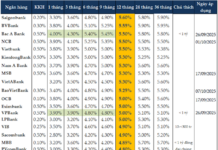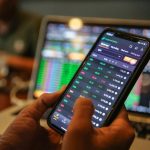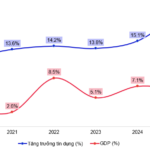
|
An insightful talkshow titled “Why is the Stock Market Stuck Around 1,200 Points?” was held on the morning of August 6th.
|
During the talkshow, economic and stock market experts delved into the factors contributing to the market’s consistent decline over the past several weeks, especially the trading session on August 5th that saw a loss of nearly 50 points.
Mr. Phan Nguyễn Hữu Phương, Director of the HCMC Branch and Head of Premium Clients at DNSE Securities, shared his insights on the market’s performance. He noted that the market had a good upward momentum in the first half of the year. Looking at the broader picture, the market has been trading sideways with a large range of 1,100 – 1,300 points. The second-quarter financial results showed growth for some large blue-chip companies, while Mid Cap stocks exhibited slower growth rates, even relatively low.

|
Mr. Phan Nguyễn Hữu Phương, Director of the HCMC Branch and Head of Premium Clients at DNSE Securities
|
The recent downward adjustment mainly affected Mid Cap stocks with average financial results that had seen significant gains in the first half of the year. In contrast, blue-chip stocks barely underwent any notable adjustments, and the market’s P/E ratio currently stands at an average of 12 to 15 times.
Additionally, the second-quarter results showed significant growth compared to the very low base of the second quarter of 2023, making the market’s current P/E ratio neither too cheap nor too expensive. The market has also been under selling pressure from foreign investors, with net selling of about 60,000 billion VND so far this year. Given these factors, the DNSE expert opined that the market’s sideways movement is already a relative success.
According to Mr. Phan Nguyễn Hữu Phương, the 1,200-point mark of the VN-Index has been a topic of discussion due to investors’ “obsession.” In reality, if we consider the period from 2009 until now, the market’s “bottom” has been gradually increasing rather than decreasing.
“This adjustment phase, if the VN-Index drops to its lowest, will only go down to 1,100 points, which is still higher than the 900-point bottom of 2022. This means that long-term investments are profitable rather than loss-making,” Mr. Phuong argued.
From a macroeconomic perspective, Dr. Nguyễn Hữu Huân, Senior Lecturer at the University of Economics in Ho Chi Minh City, shared his insights on the market’s performance. He stated that the market is currently influenced by numerous factors, especially global macroeconomic factors.

|
Dr. Nguyễn Hữu Huân, Senior Lecturer at the University of Economics, Ho Chi Minh City
|
“We are living in an era of uncertainty, making it challenging to predict what might happen in the future. Additionally, the geopolitical tensions over the past year, especially in the Middle East, have raised concerns about potential regional conflicts that could occur and spread, impacting the global economic recovery. Moreover, changes in monetary policies, such as those in Japan, have also affected the psychology of people worldwide,” shared Dr. Nguyễn Hữu Huân.
These uncertainties have led to a selling panic in almost the entire financial market recently. Typically, when one market declines, others tend to rise. However, we are currently witnessing a simultaneous decline (stock market, bitcoin price, gold price, etc.). These events have triggered a panic in the global financial market, affecting the psychology of Vietnamese investors.

|
Dr. Đinh Thế Hiển, Economist
|
From another perspective, Dr. Đinh Thế Hiển, Economist, offered his insights on the market’s performance. He attributed the market decline not only to the market’s poor performance but also to investors’ overly optimistic outlook at the beginning of the year. Meanwhile, businesses are still facing challenges, and the most significant support for the market, individual investor funds, are mostly still “stuck” in real estate. Foreign investors have withdrawn over 2 billion USD. The macroeconomic situation in the first six months has improved but is not enough to create a significant wave.
As of June, the Vietnamese stock market was a super-profitable channel compared to other domestic investment channels, reaching 11%. Therefore, the market’s decline in August is just a correction. Going forward, it is necessary to monitor whether the global macroeconomic instability will persist, as this will impact the Vietnamese stock market in the second half of the year.
Dragon Capital Chairman: “Long-term vision is needed, accepting necessary adjustments for a safer, more efficient, and higher quality market”
According to Mr. Dominic Scriven, Chairman of Dragon Capital, the role of the finance industry in the stock market will be significant in 2023 and possibly in 2024. The roles of other industries, such as real estate or consumer goods, will depend on their respective challenges.








































